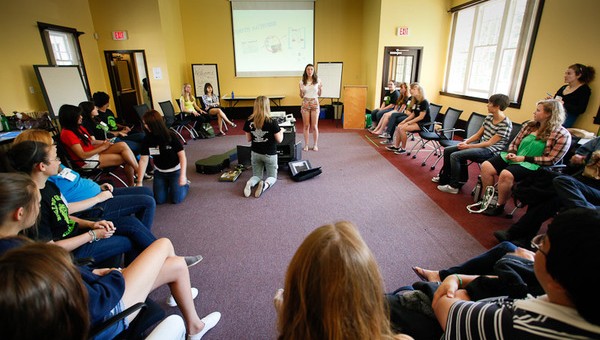Issues & Community Blog - Andrew Weaver: A Climate for Hope - Page 160
Celebrating youth in our community – Lizzie Bomford
This is the seventeenth in our series of stories celebrating the outstanding accomplishments of youth in our community. These inspirational young adults are enriching our lives with their passion and commitment to the betterment of society.
Lizzie Bomford
 I first met Lizzie briefly at the Democracy in Action Youth Conference in Victoria on October 28, 2014. Within minutes of chatting with her I recognized that she was an incredibly talented, articulate and motivated young woman. She immediately struck me as just the type of inspirational young person that Judy Fainstein and I try to feature in our Celebrating Youth in our Community series. On November 21, just a few weeks later we arranged to interview Lizzie at my constituency office. To say we were impressed with Lizzie’s passion for politics and democracy, as well as her long list of accomplishments, would be an understatement.
I first met Lizzie briefly at the Democracy in Action Youth Conference in Victoria on October 28, 2014. Within minutes of chatting with her I recognized that she was an incredibly talented, articulate and motivated young woman. She immediately struck me as just the type of inspirational young person that Judy Fainstein and I try to feature in our Celebrating Youth in our Community series. On November 21, just a few weeks later we arranged to interview Lizzie at my constituency office. To say we were impressed with Lizzie’s passion for politics and democracy, as well as her long list of accomplishments, would be an understatement.
Lizzie was nominated by Mount Doug’s principal and subsequently selected as one of only thirty BC youth leaders to attend the Democracy in Action Conference sponsored by the Rotary Club. It was a pilot initiative of the BC Ministry of Community, Sport and Cultural Development, where youth were provided with an opportunity to meet government leaders, learn about the electoral process and the operations of government. Vicki Huntington the Independent MLA from Delta South and I were honoured to speak with the thirty leaders of tomorrow and were profoundly impressed by the engaging discussions that ensued.
Lizzie was born in Victoria and moved to Port Alberni at age three. There she attended Wood Elementary School, followed by École E. J. Dunn Middle School where she was schooled in French Immersion from Grades 6 to 8. In March 2011, Lizzie applied to the Mt. Doug Challenge Program for Gifted and Talented Students. The application process included a three-hour exam. Lizzie had done her research and determined that Mt. Doug’s Challenge Program was the best fit for her. Needless to say she was accepted. At the age of just fourteen, she packed her bags and moved to Victoria to live with a family member so that she could start the challenge program in grade nine. Lizzie has thrived at Mt. Doug and has immersed herself into so many aspects of her high school, that it would be hard to cover all her activities – and there are so many.
 Lizzie has maintained a high academic standing throughout high school. Her academic load in Grade 12 includes Advanced Placement Physics, Pre-Calculus and Calculus, Chemistry and English Challenge. In addition to academic excellence, Lizzie has taken on many leadership roles in the school. She currently serves at Prime Minister in the school’s Student Council (one of three “Tri-Ministers”), which is modeled on the Provincial Legislature. Lizzie is a natural born leader with a talent for pubic speaking. This is her third year on Student Council. In Grade 11, she was Co-Minister of Environment and in Grade 10 she was Junior Minister of Environment.
Lizzie has maintained a high academic standing throughout high school. Her academic load in Grade 12 includes Advanced Placement Physics, Pre-Calculus and Calculus, Chemistry and English Challenge. In addition to academic excellence, Lizzie has taken on many leadership roles in the school. She currently serves at Prime Minister in the school’s Student Council (one of three “Tri-Ministers”), which is modeled on the Provincial Legislature. Lizzie is a natural born leader with a talent for pubic speaking. This is her third year on Student Council. In Grade 11, she was Co-Minister of Environment and in Grade 10 she was Junior Minister of Environment.
Lizzie was a founding member of the Mt. Doug Model United Nations Club. She is very interested in international politics and works hard to hone her public speaking and debating skills. At a Model Commonwealth Conference at St. Michaels University School in October 2014, Lizzie represented New Zealand.
Lizzie’s other school club involvement includes the Youth Combating Intolerance Club and she was a founding member of the Mt. Doug Club Council, which was started in September 2014. When asked what makes her upset, Lizzie immediately, and without hesitation responded “Bill 2“. She informed us about her recent visit to the legislature and watching Question Period and the debate on Bill 2 — Greenhouse Gas Industrial Reporting and Control Act. There she recalled feeling outraged at the government’s singular focus on LNG and their dismantling of greenhouse gas emissions control legislation. She described a passionate exchange between two students who were wondering “is there anything we could do?” On the lighter side, when asked what makes her happy, Lizzie offered “waking up early at 5am to watch Disney Movies” and, oddly, Broccoli!
 Athletic endeavors are a big part of Lizzie’s school life and she has joined several school teams at Mt. Doug. She was on school volleyball and curling teams in Grade 9. Since Grade 10, Lizzie has been a member of the Cheerleading Team and this year she is the Team Captain. When she joined cheerleading, she did so because “my friends bet me I couldn’t, so I decided to prove them wrong”. Although she told us “everything I do starts as a joke”, it is clear that Lizzie puts heart and soul into her athletic endeavors and her hard work pays off. After only 2 months on the cheerleading team, Lizzie broke two ribs during practice, but she persevered and her dedication has led to her becoming team captain. She loves the team bonding and appreciates that she has learned so much from the experience. She loves to see her teammates and especially the younger cheerleaders improve, recognizing that the “team is more important than me”.
Athletic endeavors are a big part of Lizzie’s school life and she has joined several school teams at Mt. Doug. She was on school volleyball and curling teams in Grade 9. Since Grade 10, Lizzie has been a member of the Cheerleading Team and this year she is the Team Captain. When she joined cheerleading, she did so because “my friends bet me I couldn’t, so I decided to prove them wrong”. Although she told us “everything I do starts as a joke”, it is clear that Lizzie puts heart and soul into her athletic endeavors and her hard work pays off. After only 2 months on the cheerleading team, Lizzie broke two ribs during practice, but she persevered and her dedication has led to her becoming team captain. She loves the team bonding and appreciates that she has learned so much from the experience. She loves to see her teammates and especially the younger cheerleaders improve, recognizing that the “team is more important than me”.
 With the same enthusiasm and dedication, Lizzie has been a member of Mt. Doug’s Track and Field Team since April 2013. “I took to the hammer throw event immediately” upon giving it a try, after joining the track team “so I could do stuff with my friends”. She has become a formidable competitor in hammer throw, discus and shot put, placing very well in BC High School Track and Field Championships. Her best result in the provincial meet was 3rd place in hammer throw in 2014 (with an impressive distance of 48 meters, 26 centimeters). Within 16 months of taking up the hammer throw, Lizzie placed 5th nationally in her age category. To achieve this success, Lizzie spent 8 hours per week at practicing and 4 hours per week in weight training.
With the same enthusiasm and dedication, Lizzie has been a member of Mt. Doug’s Track and Field Team since April 2013. “I took to the hammer throw event immediately” upon giving it a try, after joining the track team “so I could do stuff with my friends”. She has become a formidable competitor in hammer throw, discus and shot put, placing very well in BC High School Track and Field Championships. Her best result in the provincial meet was 3rd place in hammer throw in 2014 (with an impressive distance of 48 meters, 26 centimeters). Within 16 months of taking up the hammer throw, Lizzie placed 5th nationally in her age category. To achieve this success, Lizzie spent 8 hours per week at practicing and 4 hours per week in weight training.
Not surprisingly, with her enthusiasm and outgoing nature, Lizzie loves volunteering as the school mascot — the Mount Doug Ram — which she has done since arriving at Mt. Doug in 2011.
 After hearing a presentation about Our Place Society in 2012, Lizzie decided to become a volunteer there. Through this experience, she has had her eyes opened up to the societal impact of poverty and homelessness. “I could have said no, this is too hard for me to do, but I didn’t, I went back” and this volunteering has become an important part of her life.
After hearing a presentation about Our Place Society in 2012, Lizzie decided to become a volunteer there. Through this experience, she has had her eyes opened up to the societal impact of poverty and homelessness. “I could have said no, this is too hard for me to do, but I didn’t, I went back” and this volunteering has become an important part of her life.
In terms of career plans, Lizzie has a very clear vision of where she is headed in the future. In her own words:
“In the near future I would like to pursue post secondary education, studying either physics or mathematics as well as political sciences. Afterwards, I would like to begin a career in politics, starting first as an intern at the BC Legislature. Later I would like to begin running as an independent. If I should get into office I would like to push for increased funding to low cost housing, better work placement programs and better rehabilitation and drug prevention programs. To do this I believe education is the place to begin.”
Lizzie has tremendous drive, passion and is highly motivated to succeed. She is a powerful and articulate communicator who is not afraid of stepping up into a leadership role. For example, when she wanted to learn more about politics and the workings of the Legislature, she organized a field trip for the Mt. Doug Leadership class. She followed up by inviting me to participate in a broader discussion with the many leadership students at Mount Doug who were unable to participate in the tour.
Lizzie is destined for greatness. She is a leader with a vision. A vision that so many find easy to rally behind. Thank you Lizzie for inspiring those around you.
|
Match: dash and others.
<scr” +=”” “ipt=””> dash1 (dăsh)
 v., dashed, dash·ing, dash·es.v.tr. v., dashed, dash·ing, dash·es.v.tr.
v.intr.
n.
[Middle English dashen, probably of Scandinavian origin, akin to Danish daske, to beat.]
[Alteration of DAMN.] Copyright © 2014 Answers Corporation. All rights reserved. |
Let’s Take Politics out of Minimum Wage Policy
Earlier today the BC government announced that they would be increasing the minimum wage by $0.20 and implementing a process to further increase it every September, based on increases to B.C.’s Consumer Price Index (CPI).
While I am sure we can all agree that minimum wage needs to increase and that tying it to the CPI is a good thing, in my view, this announcement is merely the latest iteration of a highly politicized process for determining increases to the minimum wage.
I think it’s time we changed the way minimum wage is determined. We need to get politics out of the process as much as possible. This isn’t wishful thinking – we only have to look at the steps Ontario is taking to develop a better way forward.
In June of 2013, the Ontario government struck a Minimum Wage Advisory Panel to examine Ontario’s minimum wage policy and provide advice on an approach for determining minimum wages in the future. The panel was made up of two business representatives, one organized labour representative, one non-union employee representative and one youth representative. They engaged in a wide sweeping consultation with Ontarians from all sectors of the economy. They held town halls in ten cities, and accepted submissions online, through mail and on their website.
This process culminated in the January 2014 release of the Minimum Wage Advisory Panel Report and Recommendations to the Minister of Labour.
This is a substantial document and I encourage anyone interested in this topic to give it a read. It is very thorough provides the reader with the research and debates surrounding minimum wage policy. It is not an ideological document, but rather willingly highlights controversial issues and the need for further study.
What is important to note right away is that the public feedback the panel received contained a “near universal agreement on making the process of revising minimum wages more transparent, predictable, fair and arms-length from government’s own near-term concerns.”
This was missing from today’s announcement about the B.C. increase — it was yet another political move that wasn’t actually addressing the full extent of the problem. Annual increases tied to inflation will only ensure minimum wage doesn’t fall further behind, rather than asking whether it still has some catching up to do before indexing minimum wage to the B.C. Consumer Price Index.
The Ontario Panel wasn’t tasked with determining if the minimum wage should go up, or what the baseline value should be, but rather to advise how a process could be developed that would address multiply stakeholders concerns. For business, predictability and gradual increases (as opposed to big increases all at once) are important; for labour and those employed at the minimum wage, it’s critical that a process be established that would protect them from falling behind while ensuring careful consideration was being taken to set a rate that improved quality of life.
The fact is, changes to the minimum wage can have wide spread, and not always obvious impacts on the economy. This report does an excellent job of canvassing the research on the economic impact of minimum wages on a variety of factors, including wage distribution, low-wage workers, education and poverty. Almost universally, the research available about the impacts of minimum wage increases is not overwhelmingly positive or overwhelmingly negative, but instead suggests the need for careful and considered policy, rather than using the minimum wage to accomplish political ends.
This is particularly true when it comes to using minimum wage policy to fight poverty. For this purpose, minimum wage is a very blunt tool.
For starters, the demographics of people earning minimum wage limits its effectiveness as a measure to fight against poverty. A large number of those earning minimum wage are in fact students, many who are still living at home with their parents. Furthermore, the report points out that many minimum wage jobs are often taken as stepping stones to higher paying jobs.
This is not to suggest that minimum wage policy has no role to play in fighting poverty. Rather minimum wage is just one of a suite of policies that could and should be advanced, including housing first, skills training and taxation reform, etc. As the panel noted:
“Any linkage between the minimum wage and poverty needs to be situated within the context of various other measures to address poverty…”
It is also important that we don’t limit the description of poverty to those earning the minimum wage. There is a large gap between the minimum wage in British Columbia and the living wage – that is the minimum wage needed to ensure you are meeting your basic needs. We need to ensure that we are providing the supports for people throughout this range of incomes.
The report from the Minimum Wage Advisory Panel concludes with 4 key recommendations:
Recommendation #1: Minimum wages should be revised annually by a percentage equal to the percent change in the Ontario Consumer Price Index.
Recommendation #2: Minimum wages should be revised annually, and a minimum four months’ notice of any wage change should be provided. The effective date of minimum wage changes should be April 1 of the following year. This would result in notification by December 1 of the previous year.
Recommendation #3: The Government should undertake a full review of the minimum wage rate and the revision process every five years. This review should be conducted by a panel of stakeholders and a neutral chair. The mandate of this Panel would be to review Ontario’s past experience with minimum wage revisions within the context of Ontario’s social and economic progress and prevailing practices in other jurisdictions to recommend changes that could better serve Ontario’s future needs.
Recommendation #4: To aid the full review process, and to ensure that Ontario’s minimum wage policies are in step with the needs of it’s citizens, the Government should establish an ongoing research program for data and information gathering its subsequent analysis to address policy-relevant minimum wage issues.
Some of these recommendations will look similar to today’s announcement in British Columbia – and indeed there are flashes of good policy in what the British Columbia government has proposed. Committing to an annual increase to the minimum wage tied to the British Columbia CPI is exactly what was recommended in Ontario. However the policy in British Columbia remains incomplete until we properly de-politicize it. That will take a commitment from the government to empower a properly independent panel to conduct the necessary consultations to determine what the appropriate minimum wage level is, and how future increases will be achieved and reviewed as time moves forward.
At the end of the day, my own view is that the minimum wage is certainly too low. However, I wouldn’t be able to point to a specific number that I believe is the “right” place for a minimum wage. We need an independent, non partisan British Columbia panel to conduct an exercise similar to what was done in Ontario, but expand its mandate to recommend a new minimum wage that puts the needs of British Columbians first.
Rather than pulling a number out of a hat, advancing clear, evidence-based policy on minimum wage that is arms-length from government would end the cycle of putting politics first, and instead start making working people the top priority.
Probing the “Dereliction of Duty” in Site C Approval
Today in the house I rose in question period to ask the government once more about the economics of the Site C dam project in light of recent revelations. Since elected I’ve continued to point out the economic folly of moving forward with Site C at this time. I’ve expressed concerns on the effect it will have on our credit rating; I’ve pointed out that there are cheaper alternatives like wind or geothermal which would allow supply to keep pace with demand. I’ve also called on the government to broaden BC Hydro’s scope to allow for production of geothermal power.
Earlier this week Emma Gilchrist, Executive Director of DeSmogBlog Canada, authored a two part series on the economic justification for the Site C project. The two articles were based on an extensive interview she had with Harry Swain, former co-chair of the federal-provincial Site C review panel:
- B.C. Government Should Have Deferred Site C Dam Decision, Says Chair of Joint Review Panel
- ‘Dereliction of Duty’: Chair of Site C Panel on B.C.’s Failure to Investigate Alternatives to Mega Dam
Below is the text of my exchange with the Minister of Energy Mines. Our press release is reproduced at the end of this post.
Question
A. Weaver: Earlier this week Harry Swain, co-chair of the joint review panel appointed for the Site C dam and a former Deputy Minister of Industry Canada and Indian and Northern Affairs Canada, raised some very serious concerns about the government’s approach to approving Site C. Mr. Swain was very clear that the government was rushed in approving Site C, and British Columbians will pay for their haste. As Mr. Swain said: “Wisdom would have been waiting for two, three, four years to see whether the projections they” — that’s B.C. Hydro — “were making had any basis in fact.” That’s not exactly a glowing endorsement for the fiscal underpinning of Site C.
The review panel predicted that by building it now, Site C will actually produce more electricity than we’ll need for the first four years, costing taxpayers $800 million. My goodness, we could use that money to build a state-of-the-art sewage system in Victoria.
Mr. Swain is only the most recent person to suggest waiting a few years to see if electricity demand for the project materializes. We could still build Site C down the road if necessary, but we could use the additional time to properly explore cheaper alternatives like our vast geothermal potential in B.C. We have the time. LNG final investment decisions are delayed or not happening at all or somewhere down the yellow brick road or perhaps in never-never land.
My question to the Minister of Energy and Mines is this. Given the massive costs associated with rushing into Site C, will he hit the pause button on construction for two to four years, as recommended by Mr. Swain, and use the time to save British Columbians money and explore viable alternatives?
Answer
Hon. B. Bennett: I will answer the question. I categorically disagree with the premise of the question, but I do have to thank the member for the question. We as government announced this project in December of 2014. It’s certainly one of the largest public infrastructure projects in the province’s history, and it’s an extremely important project to the future of this of province. So I appreciate having the opportunity to stand in the House and talk about it. I’m not sure if I have a critic with the opposition. He hasn’t asked me any questions about Site C to date.
Fair enough questions about the need for the electricity, the cost of the project. These are all legitimate issues that we should be debating in this House.
I’d like to quote from the panel that Mr. Swain chaired. One of the things that Mr. Swain said was that Site C “would be the least expensive of the alternatives, and its cost advantages would increase with passing decades as inflation makes alternatives more costly.” He went on to say, in terms of debt: “The panel concludes that the risk of Site C to the province’s debt management plan is entirely manageable by a prudent B.C. government.” He went on to say: “There is little doubt about the competence of B.C. Hydro to build and operate the project efficiently.” That’s what the panel report stated.
With respect to need, the forecast that Hydro had done, this is what the panel said. The panel said that B.C. Hydro’s forecasting techniques are sound that and B.C. Hydro “has done a responsible job in forecasting.”
Supplementary Question
A. Weaver: Well, we have seen Site C pushed throughout without adequate consideration of the cost effective-effective alternatives. I’d like to quote Harry Swain again. He called this a dereliction of duty. Those are very strong words from a very highly regarded senior official from the Canadian government. To be even more blunt, it’s recklessness on the part of the government. We have a sense of the costs: a $800 million loss in the first four years of operation because of construction timing.
What we need right now is a government that is willing to show leadership on this, willing to put good policy ahead of ideological politics. My question to the minister is this. Will he listen to the call from every member of this side of the House, along with the expert opinion of the joint review panel and countless others, to send the Site C project to the British Columbia Utilities Commission for a proper regulatory review?
Answer
Hon. B. Bennett: Again, I appreciate the question from the member. I actually haven’t heard a peep from anybody on the other side of the House about Site C other than this member, but that’s fine.
They don’t seem to want to talk about economic issues for some reason or other.
B.C. Hydro has been working on this project for the last seven years. They forecasted a demand for electricity that will require the province to have 1,100 megawatts of electricity by 2024. Their forecasting methodology has been tested by the BCUC. That’s the agency that this side of the House loves so much. The BCUC has actually said that B.C. Hydro’s forecasting methodology is state of the art.
B.C. Hydro figures that we’re going to need 1,100 megawatts of electricity in 2024. We set about, over the past two years, to determine what’s the best way to get that 1,100 megawatts of electricity. We looked at absolutely everything, and the decision that we made on this side of the House was to honour the ratepayer. We chose the option that is the fairest, lowest cost to the ratepayer, but that side of the House wants us to do something different.
Media Statement – March 12, 2015
Andrew Weaver Calls for Pause on Site C Dam Development
For Immediate Release
Victoria B.C. – Andrew Weaver, MLA for Oak Bay – Gordon head and Deputy Leader of the B.C. Green Party says its time to hit the pause button on the Site C dam before British Columbians have to foot the $800 million bill for this government’s rushed decision.
Dr. Weaver’s call follows “unprecedented” comments from Harry Swain, chair of the Joint Review Panel that reviewed the Site C Dam proposal. In an interview with DeSmog Blog Canada, Mr. Swain called the government’s failure to properly consider alternatives to the dam a “dereliction of duty”.
“Mr. Swain is a highly respected former public servant. When someone like him raises such serious concerns, we need to listen,” said Andrew Weaver.
Mr. Swain, is a former Deputy Minister of Industry Canada and Indian and Northern Affairs Canada. He is concerned the government was irresponsible in rushing into its decision on Site C and instead should be taking the time to explore alternatives.
According to the panel’s report, by building Site C now the government will end up saturating the electricity market to the point where it will cost B.C. Hydro more to produce electricity than it will get from selling it. The result would cost British Columbians at least $800 million in the first four years of operation.
“The question that needs to be asked is what’s the rush?” said Andrew Weaver. “LNG isn’t materializing along the timeline promised by government. Even if B.C. Hydro’s current projections are true, we still have up to four years before we need to start building the dam. We should use that time to explore alternatives before embarking on the largest infrastructure project in B.C. history.”
Mr. Swain made it clear that alternatives to Site C exist and should have been considered. The panel, however, was not empowered to do so.
“The Minister’s talking points are missing the point.This dam didn’t make sense for BC thirty years ago, and it doesn’t make sense now.”
Andrew Weaver also joined numerous others in calling on the government to send the Site C project to the BCUC for a full, regulatory review.
Media Contact
Mat Wright
Press Secretary – Andrew Weaver MLA
Cell: 250 216 3382
Mat.wright@leg.bc.ca
Andrew Weaver Calls for Pause on Site C Dam Development
Media Statement – March 12, 2015
Andrew Weaver Calls for Pause on Site C Dam Development
For Immediate Release
Victoria B.C. – Andrew Weaver, MLA for Oak Bay – Gordon head and Deputy Leader of the B.C. Green Party says its time to hit the pause button on the Site C dam before British Columbians have to foot the $800 million bill for this government’s rushed decision.
Dr. Weaver’s call follows “unprecedented” comments from Harry Swain, chair of the Joint Review Panel that reviewed the Site C Dam proposal. In an interview with DeSmog Blog Canada, Mr. Swain called the government’s failure to properly consider alternatives to the dam a “dereliction of duty”.
“Mr. Swain is a highly respected former public servant. When someone like him raises such serious concerns, we need to listen,” said Andrew Weaver.
Mr. Swain, is a former Deputy Minister of Industry Canada and Indian and Northern Affairs Canada. He is concerned the government was irresponsible in rushing into its decision on Site C and instead should be taking the time to explore alternatives.
According to the panel’s report, by building Site C now the government will end up saturating the electricity market to the point where it will cost B.C. Hydro more to produce electricity than it will get from selling it. The result would cost British Columbians at least $800 million in the first four years of operation.
“The question that needs to be asked is what’s the rush?” said Andrew Weaver. “LNG isn’t materializing along the timeline promised by government. Even if B.C. Hydro’s current projections are true, we still have up to four years before we need to start building the dam. We should use that time to explore alternatives before embarking on the largest infrastructure project in B.C. history.”
Mr. Swain made it clear that alternatives to Site C exist and should have been considered. The panel, however, was not empowered to do so.
“The Minister’s talking points are missing the point.This dam didn’t make sense for BC thirty years ago, and it doesn’t make sense now.”
Andrew Weaver also joined numerous others in calling on the government to send the Site C project to the BCUC for a full, regulatory review.
Media Contact
Mat Wright
Press Secretary – Andrew Weaver MLA
Cell: 250 216 3382
Mat.wright@leg.bc.ca
Twitter: @MatVic
Parliament Buildings
Room 027C
Victoria BC V8V 1X4
Minimum Wage Increases need Review Mechanism
Media Statement: March 12th, 2015
Andrew Weaver: Minimum Wage Increases need Review Mechanism
For Immediate Release
Victoria, B.C. – The process for determining increases to the minimum wage needs to be de-politicized according to Andrew Weaver, MLA for Oak Bay – Gordon head and Deputy Leader of the B.C. Green Party.
His comments follow today’s political announcement of a $0.20 increase to the minimum wage. While this announcement included a process to increase minimum wage annually, there was insufficient consultation and an apparent lack of expert review to determine today’s increase and the baseline for future increases.
“This is a political move that doesn’t actually solve the problem. Annual increases tied to inflation will only ensure minimum wage doesn’t fall further behind,” said Andrew Weaver. “This government hasn’t done enough to ask whether it still has some catching up to do before indexing minimum wage to the B.C. Consumer Price Index.”
Today’s announcement contained little information about how this new rate and revision process was developed. There was no indication that a consultation process with experts and with those who are affected by potential increases took place.
“What is needed is a full, independent examination of British Columbia’s minimum wage policy, including advice about how best to determine future wage increases, and to explore what the baseline minimum wage should be,” said Andrew Weaver. “We need to move the decisions about increases into a non-politicized environment so they can be about people, not politics.”
Media Contact
Mat Wright – Press Secretary Andrew Weaver MLA
1 250 216 3382
mat.wright@leg.bc.ca










